The Global Signs of Waning US Clout are Mounting
When Senator Barack Obama spoke in 2008 to adoring crowds in Berlin, he promised to “remake the world anew”. Nowadays he struggles to reassure alienated Germans 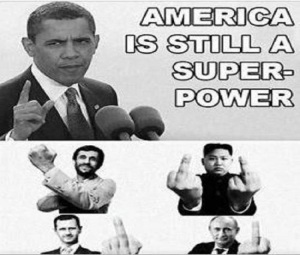 he is not spying on their leaders. It may well be that no US president – however inspirational – could restore America’s traditional global leadership. The danger is not that China will supplant America as the underwriter of global stability – Beijing is not auditioning for that role. It is that under President Obama, and whoever succeeds him, the US will find the role ever harder to discharge. From the Urals to the South China Sea, the signs of waning US clout are mounting.
he is not spying on their leaders. It may well be that no US president – however inspirational – could restore America’s traditional global leadership. The danger is not that China will supplant America as the underwriter of global stability – Beijing is not auditioning for that role. It is that under President Obama, and whoever succeeds him, the US will find the role ever harder to discharge. From the Urals to the South China Sea, the signs of waning US clout are mounting.
America’s latest “reality check” came last week with the near collapse of the Arab-Israeli peace process. Having bent over backwards to keep it on track and undertaken 12 visits to the region, John Kerry, US secretary of state, is not floundering for lack of effort. Nor, as is often rumoured, has he been hung out to dry by the White House. The truth is that the US has limited sway over either side. Mr Kerry only drew attention to the US’s weak leverage last week with his offer to release Jonathan Pollard, the Israeli spy, in exchange for a minimal commitment by Israel to keep things on track. The notion was quickly booed offstage.
The US’s success as a hegemon has traditionally been about magnifying its power through friendship. Yet its ability to rally existing friends behind it and make new ones to replace them is diminishing. Last month Mr Obama made his first visit to Brussels as president to try to galvanise Europeans following Russian President Vladimir Putin’s annexation of Crimea. His speech was well received, although it was not once interrupted by applause. Yet there is little sign that his visit succeeded in persuading Germany, Britain and others to take a radically tougher line on Russia. The US’s ability to contain Mr Putin will hinge on building a viable government in Ukraine. The odds of that happening remain poor. Nor did Mr Obama’s trip appear to breathe new life into the Transatlantic Trade and Investment Partnership talks, as many expected. If the Russian wolf cannot unify the west, what can?
While its closest allies are getting weaker, the US is finding it hard to replace them with new ones. Mr Obama cannot be faulted for trying. Since taking office, he has made overtures to India, Brazil, Indonesia – and even Russia, during the brief period of Mr Putin playing second fiddle to Dimitri Medvedev, then Russia’s president. In most cases, the US has been either rebutted or ignored. Having begun his term in office in a flurry of idealism, Mr Obama has replaced that almost entirely with the language of pragmatism. Shared universal ideals have been supplanted by hard-nosed realism. Yet the shift has had little impact on outcomes.
Saudi Arabia continues to drift away from the US, which it believes is abdicating its leadership in the Middle East. India feels no obligation to support the US on the biggest issues – last month New Delhi defended Mr Putin’s right to amputate Crimea. Turkey, like the Gulf, is disgusted with Washington’s halfhearted response to Syria. And Pakistan, like Afghanistan, which held its first round of presidential voting at the weekend, is finding it increasingly easy to ignore Washington’s admonitions. Meanwhile, Brazil’s Dilma Rousseff cancelled her country’s first state visit to the US in 20 years in October in protest at the National Security Agency scandal. It is doubtful whether Germany’s Angela Merkel would accept such an invitation even it if were on offer.
Some of this can be blamed on Mr Obama’s attention deficit diplomacy (Perhaps, his Attention Deficit Disorder problem dictates his Diplomacy, [DID]). In his Brussels speech, he made no mention of the NSA scandal, even though that is behind much of Europe’s mistrust. And his efforts to put fresh momentum behind the TTIP were nominal at best. One senior European diplomat described Mr Obama’s private comments on the trade deal as “passive aggressive”. It is striking how often European officials speak warmly of George W Bush’s personal style, even though his pugilism was widely disdained. On the world stage, as in Washington, Mr Obama is reluctant to reach out beyond his narrow coterie of trusted advisers.
Some of the US’s waning clout can also be attributed to gridlock in Washington. Capitol Hill’s reluctance to give Mr Obama fast-track negotiating authority has crippled his ability to conclude serious trade deals. Mr Obama is likely to return empty-handed from Japan later this month, a trip that was initially billed as the moment when the Trans-Pacific Partnership talks would reach fruition. Likewise, Congress’s refusal to approve the next US subscription to the International Monetary Fund, which is linked to governance reforms negotiated by successive US administrations, has infuriated China, India and other rising powers. If the US cannot update the global institutions it created, they will continue to lose relevance.
But the problem goes far beyond any weaknesses of Mr Obama as president. Seventy years ago, the US imposed a set of global institutions on the world that enshrined its universal values. Today, Bretton Woods and the UN are fraying. No country, even the US, has the power to reinvent them. Whether the US is led by a multilateralist or a unilateralist, the values underlying them are also under challenge. The world is drifting back into a situation of assertive regional powers and a weakening hegemon. It is hard to believe that whoever replaces Mr Obama will have better luck in reversing the tide.
.
Edward Luce is a columnist for the Financial Times.
.
Edward Luce
April 06, 2014
Related link – http://tinyurl.com/ocn6bwg
**************************************************************
Original topic: Obama’s attention deficit diplomacy
.
Search in this Weblog
You Don’t Deal with Terrorists
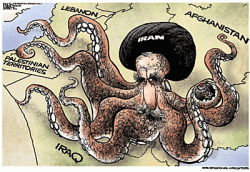
How dare the world communities led by U.S. allow themselves to make “deal” with the terrorist State of the IRI? The US State Department has described Iranian regime as an “active state sponsor of terrorism," why? Because Mullahs’ regime has killed American Marines by bomb, because Mullahs’ regime has killed American soldiers using IED, because Mullahs’ regime supports terrorist groups abroad, because Mullahs’ regime has a dreadful human rights record at home, and because Mullahs’ regime helps bloodthirsty Bashar al-Assad in killing Syrian people. ............................................................. No cause justifies terrorism; the World should not be soft on terrorism but must respond strong and fight this evil to eradicate its root from the surface of the earth.
Obsolete types of Governments for the 21st Century
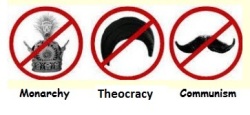
In the 21st century the Monarchy, Theocratic, and Communism are considered obsolete and impractical type regimes whose outcome are nothing more than autocracy and corruption in addition to fostering slavery and idolatry for its own people. …………….. The only down-to-earth type government is the one OF THE PEOPLE, BY THE PEOPLE AND FOR THE PEOPLE that can bring freedom and prosperity for its grassroots. And that is a secular democratic republic government based on the principle of human rights. The overriding characteristic of this demotic type regime is its short-cycle default that provides for the leader to govern, in other word it roots out any long-term opportunity for the sovereignty, which is the key element in institutionalizing corruption in the society.
Why in the Future Free Iran, a Secular Democratic Republic Type Sovereignty is the only Legitimate Government Option?
If the World Wants to Witness Peace on Earth
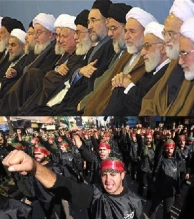
If the World Powers really want to bring peace and prosperity to the world, they have to eradicate the source of terrorism in our globe, which has been deeply rooted in Iran by the terrorist Mullahs occupiers. It is these Islamic zombies in Iran who are behind all the inhuman crimes against its own people and across not only the Middle East, including Iraq, Afghanistan, Lebanon, Syria, etc, but all over the globe. As long as they are alive the world will not witness the peace it deserves. If GWB (George Without Brain) had attacked Iran instead of Iraq in 2003 (miscalculation due to the lack of brain or too much oil-polluted brain) and exterminated these Islamic zombies, the world would have never been in this mess today. Again nobody should ever expect peace on our earth as long as the terrorist IRI mullahs are alive.
Islamic Regime in Iran, a Puppet of Foreign Powers

If it wasn’t for the continuous step-by-step support of the World Powers, these lousy Mullahs, headed by yesterday-beggar and today-criminal billionaire KHAMENEI and the professional crook RAFSANJANI, could never enforce this criminal regime of bunch of thugs and ruffians over the people of Iran for more than 38 years. Alongside our struggle on raising awareness among the Iranian grassroots against ignorance, we have to point a major part of our efforts to counteract and defy the revival subsidizing source for this brutal and puppet regime by the so-called hegemony of Western and Eastern Powers, and ask them to redirect the focus of their provision and care toward the oppressed people of Iran.
Recent Posts
- Splits within the Iranian Revolutionary Guard January 4, 2023
- The Beginning of the End of the Islamic Republic October 18, 2022
- Democracy is Not a Dying Cause April 18, 2022
- US CentCom’s Response to Yemeni’s Missiles Attack on UAE February 13, 2022
- The Shah of Iran and How he Affected Us All January 18, 2022
- Interim Iran Deal Again and Again November 19, 2021
- The IRI Nuclear Stalemate & the Way Out of It November 2, 2021
- The Jigsaw Puzzle of Israel, US, and the IRI October 17, 2021
- Iran Becomes a Non-Islamic Country September 26, 2021
- A Dark Prospect Awaits Iran August 15, 2021
- Reduced Monitoring could be Extremely Problematic February 24, 2021
- The Mullahs’ Regime is Reaching a Tipping February 18, 2021
- Biden Administration Projects Weakness February 16, 2021
- Round II of Flirting with Mullahs is About to Begin February 10, 2021
- A Critical 54-Days Awaits the IRI Regime November 28, 2020
- Trump may Win in a Landslide after all! November 3, 2020
- Why is Joe Biden Unfit for the Presidency? October 30, 2020
- Success is Going to Bring us Together October 23, 2020
- You be the Judge October 22, 2020
- Only 2 Weeks Left! October 19, 2020
- The Prospect of Trump’s Re-election October 15, 2020
- Trump’s Rhetorical Rebuff of the COVID-19 Backfires on Him October 2, 2020
- An Unconventional Presidential Debate September 30, 2020
- The Forces of Extremism and Chaos September 24, 2020
- As We Get Close to the General Election Day August 30, 2020
- Iran Dilemma becomes Problematic, amid Trump’s Re-Election August 23, 2020
- The Israel-UAE Pact, what it means? August 15, 2020
- A Turning Point for worse awaits the IRI regime August 9, 2020
- Trump’s Troubles Deepen July 19, 2020
- Trump VS Biden June 26, 2020
- The JCPOA Trigger Mechanism is Back On June 17, 2020
- America, Out of Control June 14, 2020
- Protests over Racism & Police Violence June 5, 2020
- Managing the Pandemic Disease May 19, 2020
- Why US is Changing its Containment Policy toward IRI May 13, 2020
- Stop Communist China May 7, 2020
- Democrats and the Mullahs April 27, 2020
- Presidential Election amid Coronavirus Crisis April 14, 2020
- What is on the Horizon for Iran March 17, 2020
- What is next on Iran January 13, 2020
- Isis in Iraq: Militants ‘getting stronger again’ December 23, 2019
- The IRI Regime, Prospect of Reconciliation or War? December 16, 2019
- After the Deal: A New Iran Strategy May 21, 2018
- Pompeo unveils next steps on US-Iran policy May 21, 2018
- Get Rid of the Second Amendment March 28, 2018
- This is How Gun Legislation Dies February 27, 2018
- Why I Left Islam: An Iranian-American Speaks April 27, 2017
- Trump’s Foreign Policy Act I: Kill a Chicken to Scare Monkeys April 10, 2017
- US Ambassador to the UN Reminds UN its Vital Supporting Role of Human Rights March 31, 2017
- NSA General H.R. McMaster, an Appeaser of Islam! February 25, 2017
- Obama Officials & Loyalists Torpedoed General Flynn to Protect Iran Deal February 16, 2017
- Trump’s immigration ban: 4 key questions answered January 31, 2017
- The Inspector Clouseau of Foreign Policy Calls on GOP Leaders to Repudiate their Nominee August 4, 2016
- Want to Know Why Majority of Americans Hate Hillary? Watch this Clip July 6, 2016
- Hillary, The Unpopular, Corrupt, Shameless Habitual Liar June 9, 2016
- An Election by the Wealthy & for the Wealthy June 7, 2016
- The Myth of the ‘Moderate Muslim’ May 26, 2016
- Atheists Outnumber Theists May 24, 2016
- Why Choosing Iran over Syria is a Moral and Strategic Failure for Obama May 22, 2016
- President Trump’s First State of the Union Address, January 2017 May 11, 2016
Former U.S. President Joined the Terrorist State of IRI

On September 27, 2013 former President Hussein Obama stretched out his hand and offered diplomatic engagement to the terrorist Hassan Rouhani through a phone call. The United States has long-standing concerns over Iran’s nuclear program, sponsorship of terrorism, and human rights record. The United States State Department has described Iran as an “active state sponsor of terrorism. President Obama has in fact answered the Iranian’s plea, (when in 2009 they shouted “Obama Obama ya ba oona ya ba ma”, meaning you are either with them or with us), and abandoned them by taking the terrorist IRI’s side. Iranian will never forget his disfavor to them.
Fear is the main source of superstition
The worst illiterate is the political illiterate

“The worst illiterate is the political illiterate, he doesn’t hear, doesn’t speak, nor participates in the political events. He doesn’t know the cost of life, the price of the bean, of the fish, of the flour, of the rent, of the shoes and of the medicine, all depends on political decisions. The political illiterate is so stupid that he is proud and swells his chest saying that he hates politics. The imbecile doesn’t know that, from his political ignorance is born the prostitute, the abandoned child, and the worst thieves of all, the bad politician, corrupted and flunky of the national and multinational companies.” ........... (Bertolt Brecht)
Struggle for Democracy
The Criminal Regime of IRI, 3 Decades of Bloodshed and Massacre
Oppressed People of Iran Warn the Green Reformers
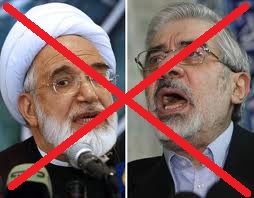
You the Green Reformers and/or any Religious Nationalists get out of the way of the oppressed people of Iran. Iranians will never put their faith and trust into the hands of parasitic mullahs, the puppets of the world powers’ hegemony. After the fall of IRI, a secular democratic government based on principle of human rights will be secured in Iran. Our nation will not have a national religion, people with or without any religious faith will live together, while nobody will be questioned for his faith conviction. Any religious practice will be performed at homes and places made for this purpose and will not be allowed in public.
Bani Sadr, Vertex of the Beegh Trianlge

Bani Sadr and two other Islamic members, Ghotb zadeh and Ebrahim Yazdi, who were known as the vertices of the “Beegh Triangle” (meaning triangle of dumbs), were the three stinky Islamic commissioners and the foreign powers’ mercenaries, whose commissions were to expedite the establishment of the provisional government for delivering the country to Islamic Mullahs. In other word these three people were the pioneers responsible for the misery that our nation has entangled in today. Bani Sadr, this Islamic jackass hasn’t quit his charlatanry yet and continues to deceive people by his Islamic political prattling. He keeps dreaming of returning to Iranian political stage, he will take his dream to his grave with him.
follow me on facebook
Archives
- January 2023
- October 2022
- April 2022
- February 2022
- January 2022
- November 2021
- October 2021
- September 2021
- August 2021
- February 2021
- November 2020
- October 2020
- September 2020
- August 2020
- July 2020
- June 2020
- May 2020
- April 2020
- March 2020
- January 2020
- December 2019
- May 2018
- March 2018
- February 2018
- April 2017
- March 2017
- February 2017
- January 2017
- August 2016
- July 2016
- June 2016
- May 2016
- April 2016
- March 2016
- January 2016
- December 2015
- November 2015
- October 2015
- September 2015
- May 2015
- April 2015
- March 2015
- June 2014
- May 2014
- April 2014
- March 2014
- February 2014
- January 2014
- December 2013
- November 2013
- October 2013
- September 2013
- August 2013
- July 2013
- June 2013
- May 2013
- March 2013
- February 2013
- January 2013
- December 2012
- November 2012
- October 2012
- September 2012
- August 2012
- June 2012
- May 2012
- April 2012
- March 2012
- February 2012
- January 2012
- December 2011
- November 2011
- October 2011
- September 2011
- August 2011
- July 2011
- June 2011
- March 2011
- February 2011
- January 2011
- December 2010
- November 2010
- October 2010
- September 2010
- August 2010
- July 2010



